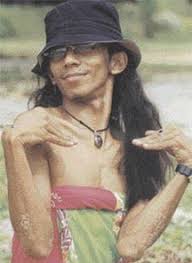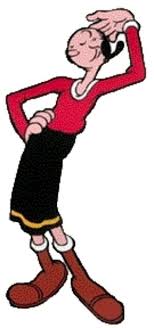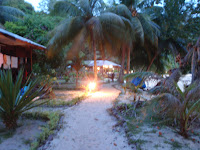 Michael Jackson, whose brilliance as an entertainer was matched only by his eccentricity, died of cardiac arrest Thursday - as dramatically and mysteriously as he lived.
Michael Jackson, whose brilliance as an entertainer was matched only by his eccentricity, died of cardiac arrest Thursday - as dramatically and mysteriously as he lived.The 50-year-old music icon fell unconscious and stopped breathing at his rented home on Sunset Blvd. in Bel Air, officials said.
The cause of death is still unknown, but several British newspapers including the London Times, Daily Mail and the Sun published reports Friday morning that linked the pop star's death to an injection of the painkiller Demerol, which the singer's aides told doctors he received after a round of strenuous rehearsals for his upcoming tour.
The news of MJ's death caught his fans all over the world by surprise.
Michael Joseph Jackson was born August 29, 1958, in Gary, IN. The fifth son of steelworker Joe Jackson, Michael displayed a talent for music and dance from an extremely young age. Joe began to organize a family musical group around his three eldest sons in 1962, and Michael joined them the following yearDubbed the Jackson 5, the group signed to Motown in 1968 and issued their debut single in October 1969, when Michael was just 11 years old. "I Want You Back," "ABC," "The Love You Save," and "I'll Be There" all hit number one in 1970, making the Jackson 5 the first group in pop history to have their first four singles top the charts.

At the impossible age of 12, the youngest Jackson son sang in a voice of startling maturity and feeling.
Motown began priming Michael for a solo career in 1971, and his first single, "Got to Be There," was issued toward the end of the year; it hit the Top Five, as did the follow-up, a cover of Bobby Day's "Rockin' Robin."
 The Jackson 5 perform during the "Sonny and Cher Comedy Hour" in 1972. The brothers, from left to right, are, Tito; Marlon; lead singer Michael, the youngest; Jackie; and Jermaine.
The Jackson 5 perform during the "Sonny and Cher Comedy Hour" in 1972. The brothers, from left to right, are, Tito; Marlon; lead singer Michael, the youngest; Jackie; and Jermaine.Later in 1972, Jackson had his first number one solo single, "Ben," the title song from a children's thriller about a young boy who befriends Ben, the highly intelligent leader of a gang of homicidal rats. Given the subject matter, the song was surprisingly sincere and sentimental, and even earned an Oscar nomination.
However, the momentum of Jackson's solo career (much like that of the Jackson 5) soon stalled. He released his fourth and final album on Motown in 1975, and the following year, he and his brothers (save Jermaine) signed to Epic and became the Jacksons.
In 1977, Jackson landed a starring role alongside Diana Ross in the all-black film musical The Wiz, a retelling of The Wizard of Oz; here he met producer/composer Quincy Jones for the first time.
Encouraged by the success of the Jacksons' self-produced, mostly self-written 1978 album Destiny, Jackson elected to resume his solo career when his management contract with his father expired shortly thereafter. With Jones producing, Jackson recorded his first solo album as an adult, Off the Wall.
Off the Wall made Jackson a star all over again. It produced four Top Ten singles, including the number one hits "Don't Stop 'til You Get Enough" and "Rock With You," and went platinum (it went on to sell over seven million copies); even so, Jackson remained loyal to his brothers and stayed with the group.
 Jackson and Diana Ross hold their American Music Awards in 1981. Jackson won for favorite soul album and Ross won for favorite female soul vocalist.
Jackson and Diana Ross hold their American Music Awards in 1981. Jackson won for favorite soul album and Ross won for favorite female soul vocalist.Released in 1982, the Quincy Jones-produced Thriller.

Jackson's 13-minute "Thriller" video in 1983 was the most expansive at the time and cost half a million dollars to make.
Jackson brought in Paul McCartney for a duet, guitarist Eddie Van Halen for a jaw-dropping solo, and Vincent Price for a creepy recitation. It was no surprise that Thriller was a hit; what was a surprise was its staying power. Jackson's duet with McCartney, "The Girl Is Mine," was a natural single choice, and it peaked at number two; then "Billie Jean" and the Van Halen track "Beat It" both hit number one, for seven and three weeks respectively.
Those latter two songs, as well as the future Top Five title track, had one important feature in common: Jackson supported them with elaborately conceived video clips that revolutionized the way music videos were made.
Jackson treated them as song-length movies with structured narratives: "Billie Jean" set the song's tale of a paternity suit in a nightmarish dream world where Jackson was a solitary, sometimes invisible presence; the anti-gang-violence "Beat It" became an homage to West Side Story; and the ten-minute-plus clip for "Thriller" (routinely selected as the best video of all time) featured Jackson leading a dance troupe of rotting zombies, with loads of horror-film makeup and effects.
Jackson sealed his own phenomenon by debuting his signature "moonwalk" dance step on May 16, 1983, on Motown's televised 25th anniversary special; though he didn't invent the moonwalk (as he himself was quick to point out), it became as much of a Jackson signature as his vocal hiccups or single white-sequined glove.
Thriller just kept spinning off singles, including "Wanna Be Startin' Somethin'," the ballad "Human Nature," and "P.Y.T. (Pretty Young Thing)"; in all, seven of its nine tracks wound up in the Top Ten.
Thriller stayed on the charts for over two years, spent 37 nonconsecutive weeks at number one, and became the best-selling album of all time; it went on to sell 25 million copies in the U.S. alone, and around another 20 million overseas.
At the end of 1983, Jackson was again on top of the singles charts, this time as part of a second duet with McCartney, "Say Say Say." In 1984, Jackson rejoined his brothers one last time for the album Victory. The following year, he and Lionel Richie co-wrote the anthemic "We Are the World" for the all-star famine-relief effort USA for Africa; it became one of the fastest-selling singles ever.
Bad was released in 1987. It debuted at number one, and the first single, "I Just Can't Stop Loving You," with vocal accompaniment by Siedah Garrett, also shot up the charts to number one. Bad became the first album ever to produce five number one hits; the others were "Bad," "The Way You Make Me Feel," "Man in the Mirror," and "Dirty Diana."
Bad "only" sold eight million copies
 Jackson performs on stage during is "HIStory" world tour concert in Auckland, New Zealand in 1996.
Jackson performs on stage during is "HIStory" world tour concert in Auckland, New Zealand in 1996.
Jackson announces plans for a summer tour at the O2 Arena in London, England on March 5, 2009

Michael Jackson was indeed a legend. He will be missed but certainly not forgotten.
 How long can influenza virus remain viable on objects (such as books and doorknobs)?
How long can influenza virus remain viable on objects (such as books and doorknobs)? What household cleaning should be done to prevent the spread of influenza virus?
What household cleaning should be done to prevent the spread of influenza virus?












































